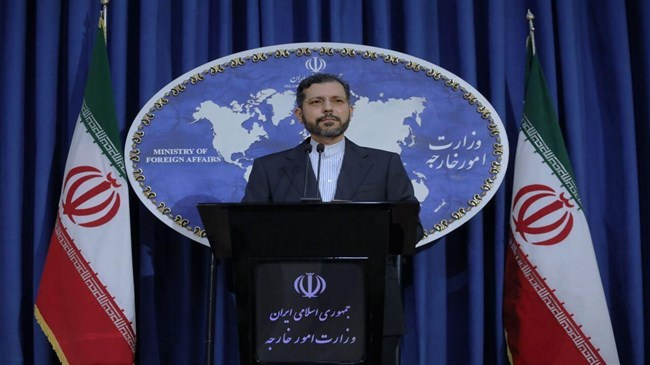Iran: JCPOA policies won’t change under new gov’t

German FM confident for Vienna talks
France, Germany, China urge negotiators to seize opportunity
Iran said on Tuesday the policies it has been pursuing on the 2015 nuclear deal with major world powers are among the “fundamental positions” of the Islamic Establishment and thus will not undergo any change when the new government takes over in August.
Speaking to reporters on Tuesday, Foreign Ministry spokesman Saeed Khatibzadeh said the new government, to be led by President-elect Seyyed Ebrahim Raeisi, will abide by an agreement that may be reached in the Austrian capital Vienna on the revival of the Iran nuclear deal, formally called the Joint Comprehensive Plan of Action (JCPOA).
The remarks came after some Western officials spoke of what they see as a need to wait for the formation of a new administration in Tehran before finalizing an agreement in Vienna, Press TV wrote.
Last week, German Foreign Minister Heiko Maas, whose country is a signatory to the Iran deal, said the talks in Vienna “are arduous but nevertheless, they are making step-by-step progress”.
“Surely there will be now a decisive phase in which one has to await whether the newly-elected Iranian president will continue to support what we have negotiated, as there are things about which we have already agreed on. That is our expectation,” Mass added.
Khatibzadeh, however, clarified that Iran’s stance on the JCPOA and the necessity for the US to remove its sanctions “are among the positions of the Establishment and will not alter with a change of administration”.
“Therefore, if an agreement is reached, the administration of Mr. Raeisi will remain loyal to it, because adherence to commitments and promises has always been a principle for the Islamic Republic of Iran, contrary to the approach of some other parties,” said Khatibzadeh, referring to the US, which signed the deal under former president Barack Obama and stopped compliance under Obama’s successor, Donald Trump.
Since April, envoys from Iran and the remaining JCPOA parties — Britain, France, Russia, and China plus Germany — have held talks in Vienna. A US delegation was also in the Austrian capital, but it did not attend the discussions because the United States is not a party to the nuclear accord.
The US left the Iran deal in May 2018 and reimposed the anti-Iran sanctions that the JCPOA had lifted. It also placed additional sanctions on Iran under other pretexts not related to the nuclear case as part of a “maximum pressure” campaign.
Following a year of strategic patience, Iran resorted to its legal rights stipulated in Article 26 of the JCPOA, which grants a party the right to suspend its contractual commitments in case of non-compliance by other signatories, and let go of some of the restrictions imposed on its nuclear energy program.
Now, the new US administration, under President Joe Biden, says it wants to compensate for Trump’s mistake and rejoin the deal, but it is showing an overriding propensity for maintaining some of the sanctions as a tool of pressure.
Tehran insists that all sanctions should first be removed in a verifiable manner before the Islamic Republic reverses its remedial measures.
“The progress made in the Vienna talks is a reality acknowledged by all parties to the talks. However, there are still important issues that need to be decided mainly by the other sides, especially the United States. In fact, the finalization of an agreement to revive the JCPOA hinges on the other parties’ political will to take tough decisions,” Khatibzadeh said.
He said the Iranian delegation to the Vienna talks “seeks to conclude the negotiations as soon as possible and [secure] a removal of the oppressive sanctions against the Iranian nation. Nevertheless, we do not set any deadline for reaching an agreement that serves the Iranian nation’s interests and continue the talks until a favorable agreement is reached.”
“As it has been said many times, we are not in a hurry to reach an agreement, but we will not allow the negotiations to become erosive and drag on,” the spokesman added.
Saving JCPOA
Maas said on Monday he was confident of reaching a deal to save the JCPOA “in the coming weeks”.
“We think [the talks] can reach their goal,” he told reporters in Madrid, according to AFP.
“I think we’ll get there in the coming weeks,” Maas added of the Iran talks that resumed in April in Vienna.
Window of opportunity
The leaders of France, Germany and China, after a three-way video call on Monday, called on all parties involved in the Vienna talks to seize a window of opportunity for an agreement, a French presidency source said, according to Reuters.
The source said that French President Emmanuel Macron, German Chancellor Angela Merkel and Chinese President Xi Jinping had spoken for more than an hour.
Source: Iran Daily

